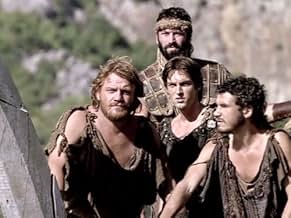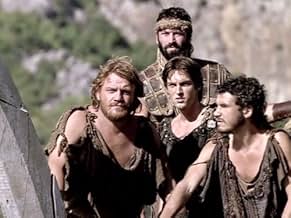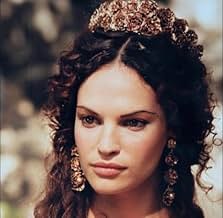Jasón y los Argonautas en busca del Vellocino de Oro
Título original: Jason and the Argonauts
Una de las aventuras más legendarias de la mitología cobra vida en la épica saga de un hombre en busca del Vellocino de Oro, un regalo de los dioses.Una de las aventuras más legendarias de la mitología cobra vida en la épica saga de un hombre en busca del Vellocino de Oro, un regalo de los dioses.Una de las aventuras más legendarias de la mitología cobra vida en la épica saga de un hombre en busca del Vellocino de Oro, un regalo de los dioses.
- Nominado a 2 premios Primetime Emmy
- 10 nominaciones en total
Explorar episodios
Opiniones destacadas
Perhaps one of the upsides to viewing this miniseries is the opportunity to see pre-'Enterprise' Jolene Blalock as Medea, the female lead. The word "chameleon" comes to my mind when i compare her physical appearance in this to that in the Star Trek series.
I agree that the Harryhausen version set the standard but this was enjoyable viewing on its own merits inclusive of seeing Ms. Blalock before she assumed the role of T'Pol.
I agree that the Harryhausen version set the standard but this was enjoyable viewing on its own merits inclusive of seeing Ms. Blalock before she assumed the role of T'Pol.
It's a good indication of just how bad television is becoming when one spends four hours watching such reprehensible ineptitude as this. As a guy who has grown up with Greek myth since I could understand language it's difficult to express how insulted I was by this ludicrous film. Taking liberties with a storyline is one thing. Reinventing it to fit a Hollywood formula is something different: the inclusion of blacks and women among the Argonauts is inexcusable no matter what the producer's motives--not because Atalanta wouldn't have made a good Argonaut, but because she wasn't, and Orpheus was Greek, not Ethiopian. The involvement of Hercules for the entire voyage instead of for only part of the first stage like in the real legend is almost forgiveable after that. For all of that however, the biggest beef with "Jason and the Argonauts" is not that it leaves out huge slabs of the journey, makes up new parts and juggles characters to suit itself. In fact, it gets some parts right: sending the dove between the clashing rocks for example, and Jason's relationship to Pilias among little else. Overall, this film is just lame, a poor, typically made-for-television sham of a cracking good story, exploiting all the best bits for all their worth and completing omitting or changing others. For those who only know the legend from this film: Orpheus wasn't black, Atalanta wasn't an Argonaut, Medea was a cold-blooded conniving bitch who cut up her own brother and fed him to the sharks and Hercules quit the voyage early on to go searching for his gay lover who got spirited away by river nymphs. Let's hope that, one day, some film producer has the guts to tell this story the way is was supposed to be told--and maybe use Hercules' real Greek name (Heracles) to boot.
In watching the movie, it was very difficult to get past Jason London's poor acting. At no point during of the movie did it ever seem like he had any grasp of his part--he never seemed regal, charismatic (a leader), or powerful. London always seemed out of place with a reasonably strong cast around him. Too bad...the movie could have been pretty good.
The mini-series is not dead as some had proclaimed. This retelling of Jason's epic journey to gain the Golden Fleece has an excellent cast and impressive FX.
Jason London is impressive as the young hero, giving this actor a long-overdue chance to shine as a new star in the heavens over Olympus. His character is the center and the anchor of the sprawling story, and he gives a strong yet appealingly vulnerable quality to his character who happens to have the same name.
Though it was odd that Poseidon looked like a bunch of rocks with legs instead of the more-common image of him as a crowned merman with trident, most of the other magical or divine elements in the story were well-acted and believably realized through the computerized FX.
This TV mini-series is a worthy successor to the 1963 film.
Jason London is impressive as the young hero, giving this actor a long-overdue chance to shine as a new star in the heavens over Olympus. His character is the center and the anchor of the sprawling story, and he gives a strong yet appealingly vulnerable quality to his character who happens to have the same name.
Though it was odd that Poseidon looked like a bunch of rocks with legs instead of the more-common image of him as a crowned merman with trident, most of the other magical or divine elements in the story were well-acted and believably realized through the computerized FX.
This TV mini-series is a worthy successor to the 1963 film.
The criterion "sense of wonder" is commonly applied to sci-fi works, but is even more relevant to the fantasy genre. When the reader or viewer is touched by feelings of awe and mystery, they feel "moved" and have a deeper, more positive reaction to the artwork being witnessed.
The Harryhausen film was much more successful at this: the Bernard Herrmann score was masterful, and certain scenes portraying the interaction of gods and human beings (such as in the temple of Hera, the transformation of Hermes, the awakening of Talos) conveyed the deep reverence and awe that Bronze Age Greeks must have felt towards their gods. This newer Hallmark version conveys an attitude towards the Greek gods closer to mockery and amusement, perhaps appropriate for the "sophisticated" Athens in the age of Euripides or Aristophanes, but certainly out of touch with the period over a thousand years earlier when Jason lived.
The Harryhausen film was much more successful at this: the Bernard Herrmann score was masterful, and certain scenes portraying the interaction of gods and human beings (such as in the temple of Hera, the transformation of Hermes, the awakening of Talos) conveyed the deep reverence and awe that Bronze Age Greeks must have felt towards their gods. This newer Hallmark version conveys an attitude towards the Greek gods closer to mockery and amusement, perhaps appropriate for the "sophisticated" Athens in the age of Euripides or Aristophanes, but certainly out of touch with the period over a thousand years earlier when Jason lived.
¿Sabías que…?
- TriviaColchis, the location of the Golden Fleece, is an actual place on the eastern coast of the Black Sea, western Georgia.
- ConexionesVersion of Jasón y los argonautas (1963)
Selecciones populares
Inicia sesión para calificar y agrega a la lista de videos para obtener recomendaciones personalizadas
Detalles
Contribuir a esta página
Sugiere una edición o agrega el contenido que falta








































